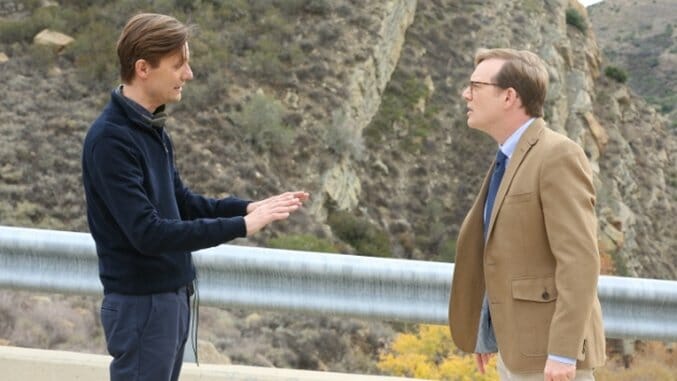Review: “Conspiracy Theory” (2.10)

When the first season of Review ended, Forrest McNeil was running into the streets after his ex-wife Suzanne, leaving the world of the show behind. Of course, he would return, which was great for us, but terrible for him. Forrest’s life has been destroyed thoroughly during the course of the show, and especially this season. What the season two finale, “Conspiracy Theory,” sets out to do is pinpoint just how things got so bad, and the end result is fantastic.
There is only really one review in this episode, and it is dedicated to believing in a conspiracy theory. After a brief visit to a Matt Besser-hosted lecture about the illuminati, the interdimensional Nazi sasquatches among them, Forrest takes a moment to look inward, and to think about the show. Until this moment, he had always assumed that his misfortunes, were dumb, random bad luck. (The episode is almost an ersatz clip show because we see a lot of the major moments of the season as Forrest thinks about them.) Then he really starts to think about it, and how awful so many of the things he’s asked to do is, and how many of them almost killed him. At this point, Forrest has fallen into a conspiracy theory. Namely, Grant, his producer, is trying to kill him.
At first, Forrest’s alarm makes sense. He breaks into Grant’s office and finds his fish oil supplements and his weird magazines of old medical equipment, but he also finds a list of all the reviews submitted to the show. Were all these awful reviews truly random? Or did Grant, say, want Forrest to kill somebody for the show? As Forrest worries, he grows increasingly unhinged, and heads to where all conspiracy theorists end up: a motel room where he can fill the walls with photos.
Forrest has gotten to a degree of truth in his ideas. Grant has been shown to care primarily about ratings, and not to care about Forrest as a person. He is a sleaze, and he is definitely partially responsible for Forrest’s woes. He could have stepped in many times, but he never has. Of course, Forrest digs deeper into his theory. He starts to wonder if Grant is messing with the results. How does a rowboat trip turn into months lost at sea? However, Forrest’s myopia becomes clear when he remembers his father’s house burning down. As his drawing clearly indicates, Forrest feels that the fire extinguisher was purposefully placed too high for him to reach. Then you remember he was walking around on his knees to find out what it’s like to be a little person, and, at any point, he could have stood up. Forrest and Grant have both been conspiring to destroy Forrest’s life. Forrest just doesn’t realize it.
Other people realize it, of course, particularly Suzanne, who Forrest visits in a fervor. Once Forrest tips over the edge, Daly gives an excellent, unhinged performance. Of course, praise for Daly’s performance is a given at this point, but he was particularly good in “Conspiracy Theory.” Suzanne tries to speak truth to Forrest, to try and make him see that his own selfishness is his main problem. Instead, Forrest ends up digging deeper into his theory until he is presuming that Grant used to be Gretchen, a girl who was in love with Suzanne in college.
-

-

-

-

-

-

-

-

-

-

-

-

-

-

-

-

-

-

-

-

-

-

-

-

-

-

-

-

-

-

-

-

-

-

-

-

-

-

-

-








































